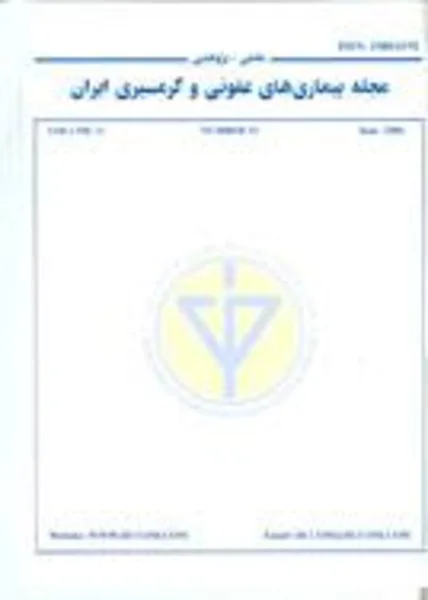-
detection of high risk human papillomaviruses in esophageal squamous cell carcinoma by pcr and dna sequencing
جزئیات بیشتر مقاله- تاریخ ارائه: 1392/07/24
- تاریخ انتشار در تی پی بین: 1392/07/24
- تعداد بازدید: 811
- تعداد پرسش و پاسخ ها: 0
- شماره تماس دبیرخانه رویداد: -
background and objectives: human papillomavirus (hpv) is one of the possible etiologic factors in development of esophageal squamous cell carcinoma (escc) especially in high risk areas. we aimed to study the frequency of high risk hpvs in escc. material and methods: 140 cases of escc were analyzed for the hpv dna by polymerase chain reaction (pcr) using gp5+/gp6+ primers to amplify a 150-bp segment of hpv genome. hpv positive samples were subsequently sequenced to identify the type of hpv. results: from 140 patients with escc enrolled to our study, 50.7% were female and 49.3% were male, aged between 20 to 81 years old. half of them were between 60-70 years. 23.6% of tumoral regions and 8.6% of non-involved tumor margins were hpv positive. the hpv positive cases were 21.7% male and 25.3 % female. from hpv positive tumor cases 36% were also positive in noninvolved tumor margins. the frequency of hpv subtypes in tumoral regions were as follow: hpv-16:60.6%, hpv-18: 30.3%, hpv-33: 6.1% and hpv-31: 3 %. we found only hpv-16 in tumor margins. there is no correlation between presence and types of hpv with patients' sex and age. conclusion: our results confirm the previously reported hpv involvement in the esophageal squamous cell carcinoma in high-risk areas. hpv-16 and 18 were the most prevalent types of hpv among the esophageal cancer cases.
مقالات جدیدترین رویدادها
-
استفاده از تحلیل اهمیت-عملکرد در ارائه الگوی مدیریت خلاقیت سازمانی و ارائه راهکار جهت بهبود
-
بررسی تاثیر ارزش وجوه نقد مازاد بر ساختار سرمایه شرکت های پذیرفته شده در بورس اوراق بهادار تهران
-
بررسی تأثیر سطح افشای ریسک بر قرارداد بدهی شرکت های پذیرفته شده در بورس اوراق بهادار تهران
-
بررسی تأثیر رتبه بندی اعتباری مبتنی بر مدل امتیاز بازار نوظهور بر نقد شوندگی سهام با تأکید بر خصوصی سازی شرکت ها
-
تأثیر آمیخته بازاریابی پوشاک ایرانی بر تصویر ذهنی مشتری پوشاک ایرانی (هاکوپیان)
-
بررسی تغییرات الکتروکوکلئوگرافی و پاسخهای شنیداری ساقه مغز در 100 بیمار مبتلا به منیر در بیمارستان رسول اکرم (ص) 1379-1377
-
تأثیر هوش هیجانی، ویژگی های شخصیتی و روابط بر تمایل به تغییر رفتار مصرف کننده در صنعت ورزش
-
واکاوی وضعیت آموزش مهارت های اساسی زندگی در پایه ششم ابتدایی از دیدگاه معلمان و متخصصان
-
بازشناسی راهکارهای طراحی مطابق با الگوهای پایداری محیطی در معماری بافت قدیم بوشهر
-
بررسی آزمایشگاهی رفتار شمع پافیلی تحت بارهای کششی مایل در خاک ماسه ای
مقالات جدیدترین ژورنال ها
-
مدیریت و بررسی افسردگی دانش آموزان دختر مقطع متوسطه دوم در دروان کرونا در شهرستان دزفول
-
مدیریت و بررسی خرد سیاسی در اندیشه ی فردوسی در ادب ایران
-
واکاوی و مدیریت توصیفی قلمدان(جاکلیدی)ضریح در موزه آستان قدس رضوی
-
بررسی تاثیر خلاقیت، دانش و انگیزه کارکنان بر پیشنهادات نوآورانه کارکنان ( مورد مطالعه: هتل های 3 و 4 ستاره استان کرمان)
-
بررسی تاثیر کیفیت سیستم های اطلاعاتی بر تصمیم گیری موفق در شرکتهای تولیدی استان اصفهان (مورد مطالعه: مدیران شرکتهای تولیدی استان اصفهان)
-
پیش بینی انسجام و کارکردهای خانوادگی در زوج ها، براساس عمل به باورهای دین
-
جرم شناسی اطفال و ارزیابی شخصیت اطفال بزهکار
-
تجلی مضامین دینی در نقوش انسانی ظروف سفالین دوره سلجوقی
-
determination of organochlorine and organophosphorous pesticide residues in irrigated water from gubi, waya dams and gudum fulani irrigation sites in bauchi lga, bauchi state,nigeria using composite sampling
-
investigation into the effect of bed stiffness on seismic performance of concrete gravity dam under far- and near- field earthquakes




سوال خود را در مورد این مقاله مطرح نمایید :